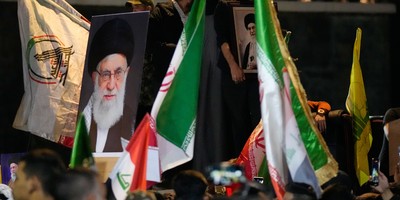Finally, some debate over U.S. war policy in Afghanistan. Or at least debate over George F. Will's call to pull the plug on U.S. war policy in Afghanistan, headlined "Time to Get Out of Afghanistan."
The negative response from conservatives was revealing. It showed that after eight years of America's post-9/11 war efforts, which started out as President Bush's vaguely named "war on terror" and never crystallized into a cogent strategy against the jihad driving the "terror," ambiguity and confusion still cloud the prevailing thinking, from the conventional wisdom to war strategy.

Most conservative rebuttals ignored Will's reckoning of just how grossly ill-suited Afghanistan is to the hallucinogenic U.S. policy of constructing a modern society out of dust as our military worms affection from a hostile population. Instead, they focused on the concept of leaving Afghanistan -- a move I, too, have advocated since April in my column and at my blog as a necessary precondition to better repulsing global jihad. Such an effort is, or should be, a multi-level campaign to reverse jihad's ultimate goal, which is to extend Islamic law by both violent and other means. In this larger context, Afghanistan is not only just one front, it is also a front too far.
Most of my conservative colleagues, however, see withdrawal from Afghanistan as surrender.
This assumption, based in the fallacy that U.S. forces are simply fighting an army called "the Taliban," rather than struggling with a culture called Islam shared by enemy and civilian alike, makes sense only if withdrawing from Afghanistan means ending our efforts against global jihad. The point of withdrawal is not to stop destroying America's active enemies in Afghanistan or elsewhere; this can continue from worldwide bases, or "lily pads," as necessary, as Maj. Gen. Paul Vallely (USA ret.) argues. The point of withdrawal is to stop trying to create an American ally out of Sharia-supreme Afghanistan, something we attempted at great expense in Sharia-supreme Iraq, and failed.
Recommended
Of course, what animates and drives most conservatives today is their vision of Iraq as a "success," and their desire to repeat that "success" in Afghanistan. What has become increasingly clear to me, however, is that an infidel nation cannot fight for the soul of an Islamic nation. This, in effect, is what our "nation-building" troops have been ordered to do both in Iraq and Afghanistan. Let me rephrase: An infidel nation can indeed fight for the soul of an Islamic nation. It just can't win it.
It also turns out there is nothing there for infidels to win. After six U.S.-intensive years, Iraq remains just another OPEC-participating, Israel-boycotting, Hezbollah-sympathetic, Sharia-supreme, anti-U.S. entity with new and improved ties to Iran. Why? Our belief systems, Islam's and the West's, are so diametrically opposed that our interests cannot intersect. Left and Right in this country, however, scrub this truth and its centuries of confirming history from all policy -- an antiseptic way to view conflict in the world that will always miss the cure by ignoring the germs.
On this count, Will's column is no different, never once contemplating Islam. Which is why his conclusion may be a little fuzzy. Describing his "offshore" alternatives to basing a massive army inside Afghanistan, Will identifies the key mission as "concentrating on the porous 1,500-mile border with Pakistan, a nation that actually matters."
I'm not sure what Will means by calling Pakistan "a nation that actually matters." Certainly, Pakistan's nuclear arsenal "matters" because it could hurt us, and thus our national security demands an execution-ready plan to neutralize it. But Pakistan, a jihad-based culture, doesn't "matter" in terms of fitting into an anti-jihad alliance -- the ultimate goal, whether admitted or not, of efforts to work together. It can't. Quick facts: Pakistan's army's motto is "Faith, piety and holy war in the path of Allah." Seventy-eight percent of its people, the latest Pew Poll tells us, support the death penalty for leaving Islam. Not exactly our ideal match.
But we keep such politically incorrect facts out of focus. Then we struggle to see why things go wrong. More clarity is required. More debate is essential. Eight years after 9/11, this means finally reckoning with Islam -- discussing jihad, analyzing Sharia, understanding dhimmitude -- as a strategic factor in U.S. policy.
























Join the conversation as a VIP Member